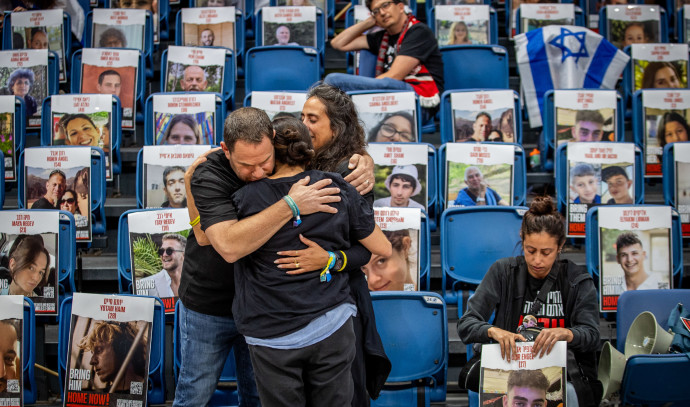As Gaza residents suffer, guilt and fear stalk their families abroad
The people of Gaza have been living for weeks under constant bombardment, cut off from supplies of food, water, and medicine. Communications are also frequently disrupted, so those living outside the territory can find out about their families there only through sporadic text messages with WhatsApp or phone calls. They are desperate for any signs their loved ones are alive. Some say they barely sleep. Others barely eat.
Even drinking a glass of water — a simple act at her home in Jordan, but a luxury for those trapped in the besieged enclave, like her mother — makes her feel guilty, Alfranji said. “Every time I drink this water, I feel I wish I could pass one cup for my mom,” she said.
Like many people around the world with families in the Gaza Strip who are anxious for news of their loved ones, wondering if they are still alive, whether they are hungry or hurt, Reem Alfranji is also consumed with guilt.
Many grew up in Gaza and know what it is like to run from an airstrike, or how shattered glass turns into shrapnel. And while they know they can’t stop the bombardments, some said they wished they were there with their families, knowing how much they are suffering. About 13,000 people — including about 5,000 children — have been killed in Gaza as of Nov. 22, according to the health ministry in the enclave. Israel launched its military campaign against Gaza in response to brutal attacks by Hamas, the group that runs the enclave, on Oct. 7. Israel says that about 1,200 people, mostly civilians, were killed and 240 hostages abducted in those attacks. Israel, aided by Egypt, has restricted food, water, medicine, and fuel to the strip, although some aid and fuel have trickled in. Almost all residents are banned from leaving. Some hope of a respite came Wednesday when the Israeli government and Hamas announced an agreement to pause the fighting for at least four days to allow for 50 of the hostages in Gaza to be released. In the meantime, however, civilians have been getting sick from dirty water, dying in hospitals that cannot treat them, and living off scraps of bread — if they can find any. “Here I am, having whatever I want,” said Mohammed Salah Arafat, a Washington, D.C., resident with a brother still in Gaza. “When it comes to food, when it comes to freedom, when it comes to rights, when it comes to freedom of movement, the feeling of guilt is killing me,” said Arafat, 30, who left Gaza in 2018. Faress, Arafat’s brother, had been volunteering as a nurse at Gaza’s Shifa Hospital, which has run out of the basic supplies it needs to treat patients and ceased to function, according to the World Health Organization. He had been subsisting on a can of beans a day that he heated by dipping a cotton ball in alcohol and lighting it on fire, Arafat said. When the beans ran out, he survived off an electrolyte solution the hospital normally gave to patients. Arafat said his brother had left the hospital, which was raided by Israeli forces last week. “I cried almost every single day since the beginning of the war, until two weeks ago. I became numb, emotionless, but I don’t know how to suppress how sad I am anymore,” Arafat said. Iman Ayman, a 29-year-old living in England, can barely stop herself from crying when she recounts how her sister gave birth in a Gaza hospital without painkillers. Her sister was pregnant when the war broke out, Ayman said, and had just finished decorating the baby’s room. She’d been studying to be an oncologist, Ayman said. On Oct. 17, her sister’s water broke, and she needed to get to a hospital, Ayman said. But the roads were filled with rubble, and the cars had no fuel. So her sister walked nearly an hour with her mother and her brother by her side, only to wait 18 hours for a bed when they finally reached a hospital. Ayman’s brother waited in a blood-spattered hallway, she said. He told her he shut his eyes so he wouldn’t have to see the dead bodies and body parts that medical workers carried in. Ayman, who did not want to give her siblings’ names, for fear they could be targeted by Israeli forces, said her sister had needed an episiotomy — a surgical incision to help remove her child. The doctors cut into her while she screamed. “They had to take my mother outside of the room,” Ayman said. “The doctors didn’t want my mom to see this.” Ayman and Alfranji have both lived in Gaza. Both women have numerous family members there, including Alfranji’s parents, whose home was destroyed early in the war. They have been living in her uncle’s house in the south of Gaza, along with her brother, his wife, and dozens of other relatives. Explosions at night have terrified Alfranji’s father, who has Alzheimer’s. “My mom says sometimes he’s doing fine, and he can’t really understand what’s happening around him, but sometimes he gets really scared because of the voices and the sounds,” Alfranji said. “In the one room, four or five people sleep all together, so he finds one of my cousins, and he puts the blanket on her, and he tells my mother, ‘This is your daughter, this is Reem, so please keep her warm.’” Another relative began suffering from kidney failure in the first few days of the airstrikes. He tried Al-Quds Hospital, but it had no room. He tried Shifa but was also turned away. Two days later, he was dead. Alfranji said the family felt lucky they could bury his body, because even graves are hard to find. She has stopped starting her text messages with “How are you?” “‘We’re waiting our turn to die’ — everyone in Gaza says that,” Alfranji said. This article originally appeared in The New York Times .




:quality(70):focal(3155x1595:3165x1605)/cloudfront-us-east-1.images.arcpublishing.com/tronc/EVIZZP5UQJD5ZBMT4QA6WJZR7A.JPG)












